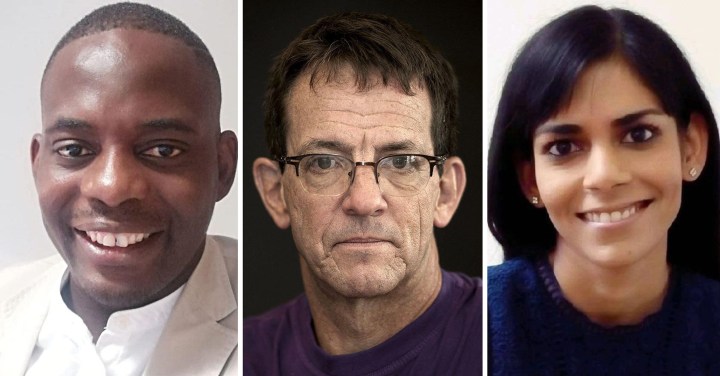DAILY MAVERICK WEBINAR
Law is weaponised against vulnerable whistle-blowers, say experts

The Protected Disclosures Act does not do enough to protect whistle-blowers – it is in fact used to frustrate and intimidate them – but the courts and legal fraternity still have a duty to ensure it is not misused, webinar hears.
‘The role of whistle-blowers is well recognised, including by the Zondo Commission and the President. Yet whistle-blowers experience many common forms of retaliation and suffer for exposing corruption. However, there are other ways the corrupt legally retaliate against whistle-blowers, that are costly, emotionally taxing and have led some to impoverishment,” Maverick Citizen editor Mark Heywood told a webinar whistle-blowing on Tuesday.
Heywood was in conversation with experts in the field Avani Singh, who is an attorney of the High Court of South Africa and a digital rights specialist, and Mthabisi Moyo, an anti-corruption and human resources governance principal consultant.
“Corruption is a crime of calculation, not passion, and happens under the cover of darkness and not in the public eye,” Moyo said. He explained that whistle-blowing has been proven to be the most effective tool against corruption and that it acts as “a deterrent to corruption as it increases the risk of getting caught and when it is fostered as a culture within organisations it becomes costly in your calculations whether or not to engage in corruption”.
Moyo said whistle-blowing was critical to unearthing unethical behaviour and important for the long-term effectiveness of an organisation.
There is also a glaring gap when it comes to the remedies afforded by the legislation, such as compensation for the many losses, including financial, family, mental health and employment.
Singh stressed the importance of appreciating that whistle-blowers are people with faces who face real consequences for their actions.
“One of the big challenges we’re facing is that on the one hand we’re seeing the law being weaponised through abuse of process and lengthy delays. As opposed to being used as a tool for justice, it has become a tool to avoid accountability and coupled with that we are seeing the profession, courts and the legal framework not responding adequately or quickly enough to address the misuse of these processes,” she said.
Speaking about the risks of whistle-blowing, both Moyo and Singh said that current legislation did not do enough to protect people from intimidation and retaliation, leading them to feel that the Protected Disclosures Act was failing whistle-blowers. Moyo added that the act does not extend to civilians outside the working class and is limited to those working formally in an organisation.
Read more in Daily Maverick: Report takes aim at loopholes in ‘useless’ Protected Disclosures Act
There is also a glaring gap, according to Moyo, when it comes to the remedies afforded by the legislation, such as compensation for the many losses, including financial, family, mental health and employment, which are not taken into consideration – even if a person is reinstated in their job, they are only compensated six to 12 months’ salary.
Singh pointed out that part of people’s frustrations was that the resultant legal proceedings are often lengthy and draining and sometimes make people doubt whether they should be pursuing them.
This, she said, is an intimidation tactic not only against the whistle-blower but against anyone else thinking of coming forward, with organisations building a narrative that the whistle-blower is doing it for personal promotion and gain.
Singh emphasised that as part of the legal profession legal practitioners owe a duty to the court and to represent whistle-blowers as best they can and help the court by doing due diligence while advising their client accordingly. More frank conversations within the profession about whistle-blowing were needed, while courts also had an obligation to control court processes and “not get lost in the noise that comes with political cases”.
She conceded, however, that ulterior processes are not necessarily the only problem in the courts, but that there are serious resource constraints from being flooded by too many cases, which means they don’t always get the necessary attention. Singh suggested that resource constraints could be addressed by specialised courts.
Lessons from abroad?
Heywood asked whether there are international best practices that could be looked at to strengthen South Africa’s whistle-blowing legislation. Moyo responded that he would look to Australia, since it was a leader in research on whistle-blowing, as well as the UK’s Public Interest Disclosure Act, within the context of South Africa’s challenges.
On the matter of incentivising people who come forward with information, Moyo said that while there have been some successes with this in the US, Canada and South Korea, it would not be his go-to choice.
“Let us focus more on nipping corruption in the bud – get big people in jail and let them know there are consequences to intimidating people.”
Moyo told the audience that whistle-blowers should never “lose heart” but should exercise extreme situational awareness and understand whether the culture of their organisation responds positively to information disclosure or whether it responds with intimidation. DM/MC





















 Become an Insider
Become an Insider
Comments - Please login in order to comment.